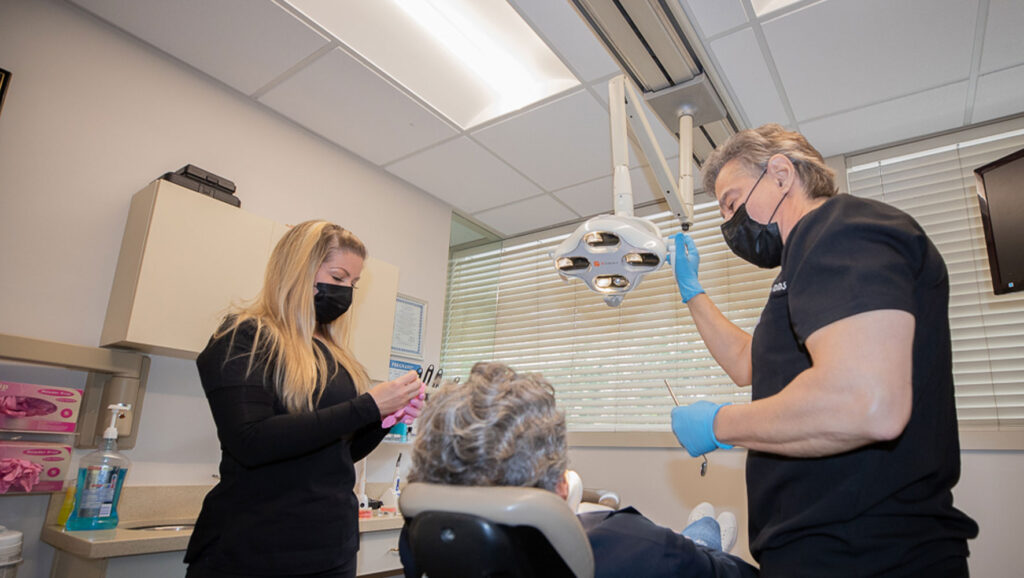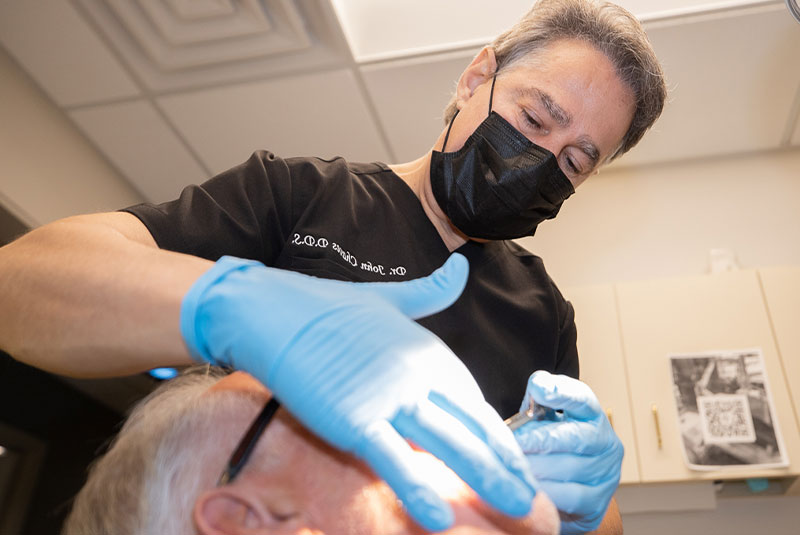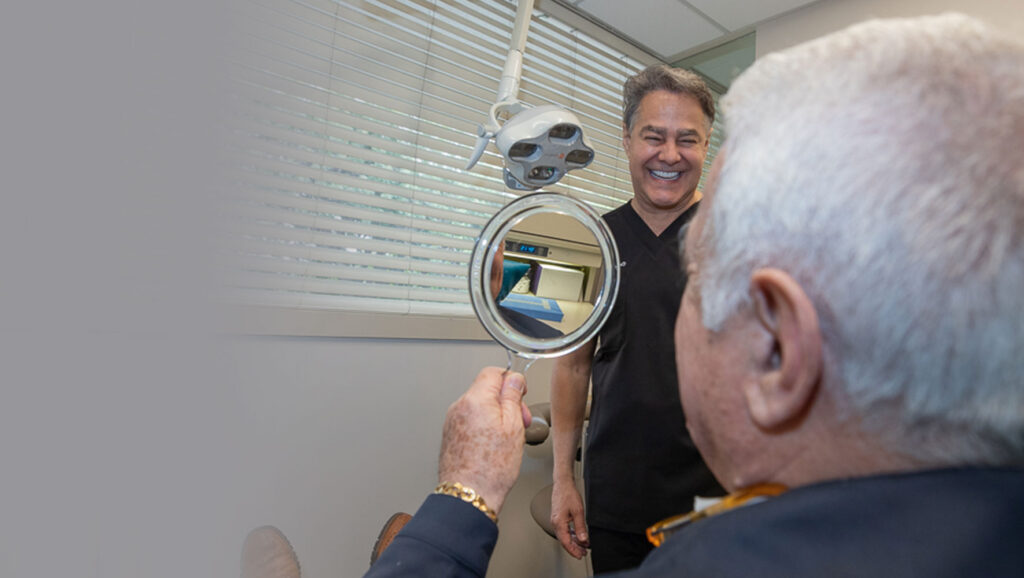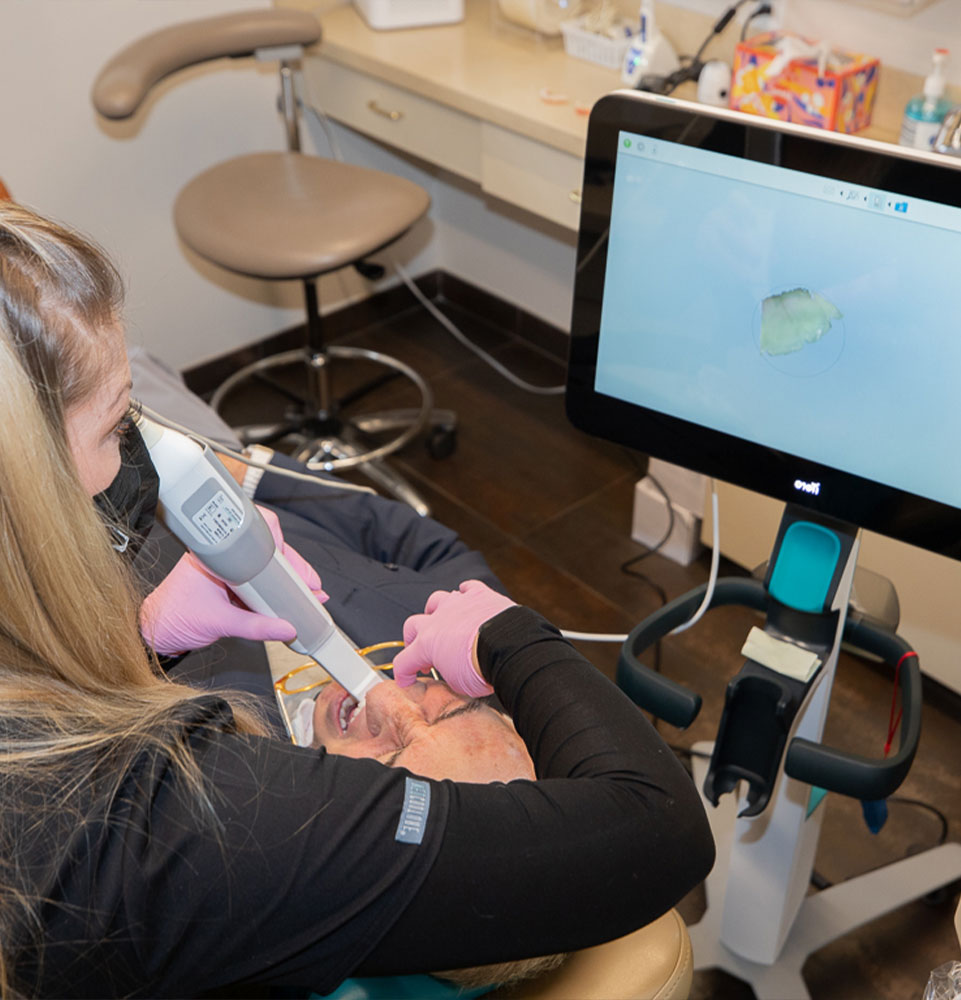

Dentures are an excellent option for replacing teeth. However, without proper maintenance, they can become uncomfortable and ill-fitting, causing damage to your gums and any remaining teeth. Make sure to follow the denture care instructions given to you by our dental professional, ensuring your dentures stay in great shape and last as long as possible.
If you have any questions or concerns about your denture care, contact our Woodland Hills dentist at John M. Chaves, DDS, today by calling 818-491-7294.
At John M. Chaves, DDS we offer high-quality, yet affordable denture solutions and are in network with many leading insurance companies.
Dentures are a type of removable dental appliance designed to replace missing teeth. They are custom-made to fit each individual’s mouth and can be made from a variety of materials, including acrylic, metal, and ceramic. Dentures can be classified into two main types: complete dentures and partial dentures. Complete dentures are used to replace all the teeth in the upper or lower jaw, while partial dentures are used to replace one or more missing teeth.
Dentures are designed to improve the appearance and function of the mouth, allowing individuals to eat, speak, and smile with confidence. They can also help to support the facial structure and prevent the cheeks and lips from sagging. However, dentures require regular cleaning and maintenance to ensure they remain in good condition and continue to function properly.


Dentures should be cleaned daily to remove food particles and prevent the buildup of bacteria. It is also important to remove denture adhesive effectively during daily cleaning to ensure optimal fit and gum health. Use a soft-bristled brush and a gentle soap or denture cleanser to clean the denture thoroughly. Make sure to avoid using harsh soap or toothpaste, as these can damage your dentures. Rinse dentures before placing them back into the mouth.
Dentures are delicate and can be easily damaged if handled roughly. When cleaning them, be sure to handle your dentures carefully to avoid scratching, damaging, or breaking them.
Soak dentures overnight in water or a denture-soaking solution to help remove bacteria and keep them clean. However, make sure you follow instructions for soaking dentures and never use hot water, as it can cause your dentures to warp.
Dentures should be stored in a clean, dry container when not in use. Make sure the container has a lid and is placed in a safe location where it won’t be accidentally dropped or knocked over.
If a denture is damaged or not fitting properly, visit our Woodland Hills dentist to have it repaired. If you try to fix broken dentures yourself it can cause further damage and potentially render the denture unusable.
Just because you have dentures doesn’t mean you should neglect your oral hygiene as a denture wearer. Brush your gums, tongue, and remaining natural teeth with a soft-bristled brush and fluoride toothpaste twice a day. This will help prevent gum disease and other oral health problems that weaken dentures.
Regular dental checkups are essential for maintaining good oral health, even if you have dentures. A dental professional can check your dentures for any signs of wear or damage, as well as examine your gums and remaining natural teeth. We may also recommend adjustments or replacements if necessary.

Proper care of the gums and natural teeth is essential for denture wearers. Brushing the gums, tongue, and roof of the mouth with a soft-bristled brush can help remove plaque and improve circulation. Regular brushing can also help prevent gum disease and other oral health issues.
It’s also important to clean the natural teeth thoroughly, especially if you have partial dentures. Use a fluoride toothpaste and a soft-bristled toothbrush to clean the teeth, and pay special attention to the areas where the dentures meet the natural teeth.
Dentures can be made from a variety of materials, including acrylic, metal, and ceramic. Each material has its own unique characteristics and requires specific cleaning and maintenance.
Acrylic dentures are the most common type of denture and can be cleaned with a mild soap and water. Metal dentures, on the other hand, require a specialized cleaning solution to prevent corrosion. Ceramic dentures are more durable than acrylic dentures but require a gentle cleaning solution to prevent scratching.
When cleaning dentures, it’s essential to use a soft-bristled brush and a mild soap or denture cleanser. Avoid using harsh chemicals or abrasive cleaners, as they can damage the dentures. Rinse the dentures thoroughly with warm water and soak them overnight in a denture soaking solution to keep them clean and fresh.

There are several common mistakes that denture wearers make when it comes to caring for their dentures. One of the most common mistakes is not cleaning the dentures regularly. This can lead to the buildup of plaque and bacteria, which can cause bad breath, gum disease, and other oral health issues.
Another common mistake is using harsh chemicals or abrasive cleaners to clean the dentures. This can damage the dentures and weaken them over time. It’s also important to avoid using hot water to clean the dentures, as this can cause them to warp or become misshapen.
Finally, many denture wearers make the mistake of not storing their dentures properly when they’re not in use. This can cause the dentures to dry out and become brittle, which can lead to breakage.
Poor denture hygiene can have serious consequences for denture wearers. If the dentures are not cleaned regularly, plaque and bacteria can build up, leading to bad breath, gum disease, and other oral health issues.
Poor denture hygiene can also lead to the weakening of the dentures, making them more prone to breakage. This can be costly and inconvenient, as well as painful.
Furthermore, poor denture hygiene can also affect the overall health of the individual. Research has shown that there is a link between gum disease and other health conditions, such as heart disease and diabetes.
Therefore, it’s essential to prioritize good denture hygiene and follow a regular cleaning and maintenance routine to ensure the dentures remain in good condition and continue to function properly.

Knowing when it’s time to replace your dentures is crucial for maintaining your oral health and comfort. Common signs that your dentures need replacement include:
If you’re experiencing any of the problems mentioned above, contact our Woodland Hills dentist today at 818-491-7294 to schedule an appointment. We’ll examine your dentures and recommend the best course of action.
No, it’s not recommended to use regular toothpaste to clean your dentures. Regular toothpaste can be abrasive and damage the surface of the dentures, causing scratches and creating places where bacteria can accumulate. Instead, denture wearers should use a cleaner specifically designed for dentures, which is gentler and more effective in removing stains, bacteria, and food particles from the denture surface. Using appropriate denture cleansers, such as tablets or soaking solutions, ensures proper denture hygiene and helps prevent oral health issues.
Yes, dentures can break if dropped or mishandled. Dentures are made of acrylic resin, which is a hard but brittle material that can fracture or crack under pressure. If your dentures do break, don’t attempt to repair them yourself, as it may cause further damage.
To prevent your dentures from becoming stained, you should avoid drinking dark-colored liquids like coffee, tea, red wine, and fruit juices. You should also avoid smoking, as it can cause discoloration and stains on your dentures.
At John M. Chaves, DDS, we believe that denture care is essential to maintaining optimal oral health and quality of life for our patients. We recommend that patients clean their dentures regularly, avoid staining foods and beverages, and visit our office at least once a year for a checkup and adjustment.
If you’re looking for comprehensive dental care for your dentures, we invite you to schedule an appointment with us today by calling our Woodland Hills dental office at 818-491-7294.
I understand the information disclosed in this form may be subject to re-disclosure and may no longer be protected by HIPAA privacy regulations and the HITECH Act.
